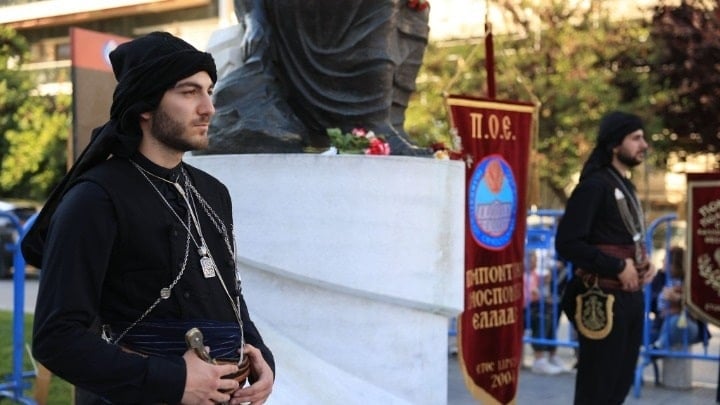

As Greece marked the Genocide of Pontic Greeks on May 19, Turkey rejected the allegations that an extermination took place, describing them as “delusional” and incompatible with historical facts.
Greek President Konstantinos Tasoulas called for the recognition of the Pontic Greek Genocide by the international community. “The international recognition of the Genocide of the Pontic Greeks constitutes the minimum tribute to the lives of these people and a contribution to efforts to prevent the repetition of similar heinous crimes in the future.”
The Greek Parliament honored the day by lighting up the facade of its building on Monday evening. Projected on the facade of Parliament was a logo with the initial ‘G’ of the Genocide, inspired by a photograph showing the march of 5,000 orphan children near Harput in 1922. The curved shape of the ‘G’ is made up of human figures on a march, commemorating the ‘death marches’ of displaced Greeks of Pontus in which most perished.
The plant depicted in the logo represents a bunch of amaranth, the plant that retains its bright yellow color and the shape of its flowers long after it is cut. This symbolises the dynamism of Pontian Greeks who managed to survive, holding on to their historical memory and culture despite the genocide by the Turks and the loss of their homeland.
No forgetting and no silence can cover the murder of 353,000 Greeks of Pontus during the years 1916-1923, the Parliament said in its statement, adding a phrase by the Panpontian Federation of Greece, “If we forget, we will perish.”
In a written statement, the Foreign Ministry in Ankara rejected the allegations, calling them unfounded attempts to discredit Turkey’s War of Independence, launched under the leadership of Mustafa Kemal Atatürk on May 19, 1919.
“These imaginary claims, fabricated to tarnish our national struggle, are entirely baseless,” the statement said. “They aim to rewrite history and defame the legacy of our War of Independence.”
The ministry underscored that it was the Greek army, during its occupation of Anatolia with the backing of imperialist powers, that committed widespread atrocities — acts that were documented by the Allied Commission of Inquiry and recognized in Article 59 of the Treaty of Lausanne. The treaty obliged Greece to pay compensation for violations of the laws of war.
The statement also addressed the historical context of Pontic activities, linking them to Greece’s irredentist “Megali Idea” ambitions in the late 19th century. These efforts, Ankara noted, were ultimately defeated by the resolve of the Turkish people.
“We urge Greek authorities to stop distorting history for populist gains and instead reflect on the crimes committed against Turks and other ethnic groups, starting with the 1821 Tripolitsa massacre,” the ministry added.
Ankara warned that efforts to stoke animosity through historical revisionism risk undermining the positive momentum in Turkish-Greek relations. “Such hostile initiatives must come to an end,” the ministry said.
